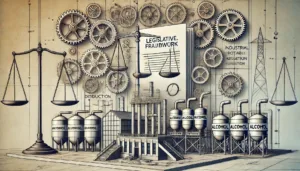Facts:
The appellant, National Highways Authority of India (NHAI), issued a circular allowing deputation service to be counted as regular service for promotions. Respondent No. 1, G. Athipathi, initially served on deputation as Manager (Technical) from 2008 to 2014 but was repatriated to his parent department. Subsequently, he was directly recruited by NHAI in 2015 as Manager (Technical). His request to count his prior deputation service for promotion to Deputy General Manager (Technical) was denied, leading to litigation. The Central Administrative Tribunal (CAT) and the Madras High Court directed NHAI to count his deputation service, which the appellant challenged.
Contentions of the Appellant:
The appellant argued that the respondent’s deputation service could not be considered for promotion due to a significant gap between his deputation tenure and permanent appointment. NHAI emphasized that the respondent was ineligible for promotion based on Recruitment Regulations, which required four years of continuous service. The gap disqualified him, and extending the benefit to him would be contrary to the circular’s intent.
Contentions of the Respondent:
The respondent contended that the circular mandated consideration of deputation service for promotion and did not explicitly exclude candidates with a service gap. He argued that he fulfilled the required four years of service during deputation and was discriminated against as three similarly placed officers were promoted under the same circular. He highlighted the arbitrariness of the appellant’s actions.
Issues:
- Whether the deputation service of Respondent No. 1 could be counted as regular service for promotion despite the gap.
- Whether the respondent was eligible for promotion under the Recruitment Regulations and the circular.
- Whether the circular’s provisions were applied discriminately.
Observations/Findings by the Supreme Court:
The Court noted that the respondent’s repatriation to his parent department and subsequent re-entry into NHAI through direct recruitment constituted a fresh appointment. It clarified that the circular’s provision for counting deputation service was not intended to cover cases with significant gaps in service. The respondent’s situation differed from those who remained continuously in NHAI’s service. The Court emphasized that the one-time benefit under the circular aimed to address specific cases without altering the recruitment framework.
Principle of the Case:
Deputation service may be counted as regular service for promotion only when explicitly permitted by regulations or circulars and in the absence of a service gap. Continuity of service within the organization is a critical factor for eligibility under such provisions.
Final Order:
The Supreme Court allowed the appeal, setting aside the orders of the CAT and the High Court. It held that the respondent’s deputation service could not be considered for promotion due to the break in service. The respondent would be considered for future promotions based on his date of direct recruitment, without recovery of any excess payments made.
Impact on Public Law and Order:
The judgment reinforces the principles of procedural fairness and regulatory adherence in public administration. It clarifies the boundaries of discretion under employment policies, ensuring that benefits are extended equitably and within the prescribed framework. This promotes trust in public institutions and discourages arbitrary practices.
Case Citation: Supreme Court of India, National Highways Authority of India v. G. Athipathi & Ors., Civil Appeal No. 14100 of 2024, Decided on December 9, 2024.








